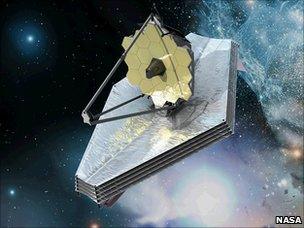JWST price tag now put at over $8bn
- Published

The telescope and its instruments will be shaded by a structure the size of a tennis court
Nasa says it will now cost $8.7bn to launch the James Webb Space Telescope in 2018 and operate it for five years.
The assessment - some $2bn higher than previous estimates - has emerged from documents sent to the US Congress.
James Webb is regarded as the successor to Hubble and will carry technologies capable of detecting the light from the first stars to shine in the Universe.
But delays and cost overruns have dogged the project, and now some politicians want JWST cancelled.
The House Appropriations Committee put forward a draft 2012 budget for the US space agency last month that would terminate funding for the observatory.
The equivalent Senate body has yet to have its say, however.
Nasa itself has fiercely defended the telescope, with senior officials describing JWST as one of their top priorities.
The observatory is supposed to be the next great undertaking in space astronomy, incorporating the biggest mirror ever sent into orbit. Its near-infrared detectors promise a swathe of remarkable discoveries about the early cosmos.
But getting the observatory ready for flight has proved to be a major technological challenge.
An independent assessment last year suggested the telescope's total cost had ballooned from $3.5bn to $5bn, and that continued delays would inflate the final bill well beyond $6bn.
In parallel with the price escalation, the probable launch date has slipped deeper and deeper into the decade with some commentators wondering whether JWST might not even be ready to fly this side of 2020.
Nasa responded to all the criticism by making management changes and ordering a "bottoms-up review" of the project.
It is this review that has now established the $8.7bn figure as the new baseline price tag for JWST, a Nasa spokesman told BBC News. It is the full life-cycle cost - to build, launch and operate the observatory.
The agency would explain how to fund the revised baseline in the US President's 2013 budget request to Congress made at the beginning of next year, the spokesman added.
One complicating factor for US politicians as they move to decide the future of JWST is the international fall-out that would result from cancellation.
JWST is being prepared in partnership with Europe and Canada. Europe, for example, is providing two of the telescope's four instruments and the rocket to put it in orbit. This commitment would guarantee its astronomers 15% of the observing time on the observatory.
<link> <caption>Jonathan.Amos-INTERNET@bbc.co.uk</caption> <url href="mailto:Jonathan.Amos-INTERNET@bbc.co.uk" platform="highweb"/> </link>
- Published18 August 2011
- Published7 July 2011
- Published11 November 2010
- Published20 October 2010